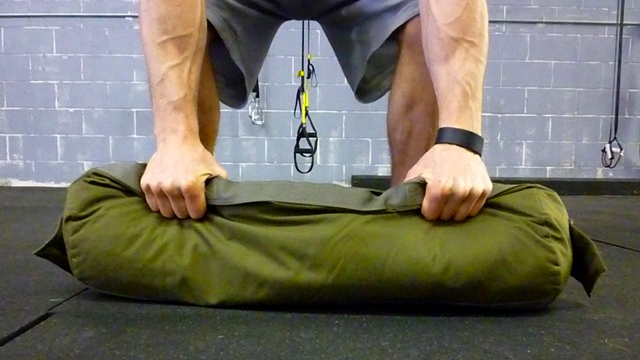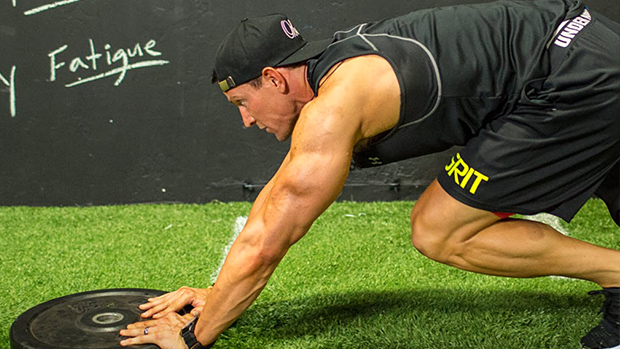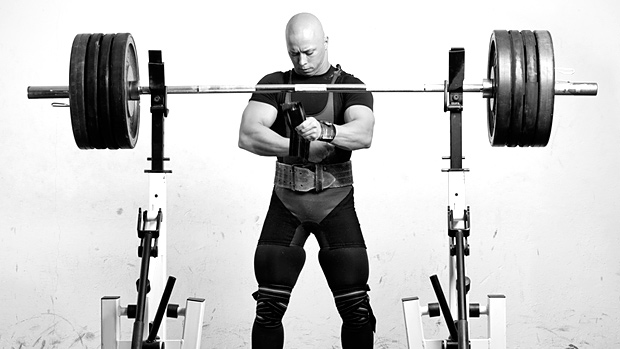Is the sandbag the key to elite strength and conditioning? Probably not. It isn't a miracle tool and likely not the missing link between you and strength training glory. However, used properly, sandbags can certainly be an effective adjunct to a solid resistance-training program.
Before you rush out and start stealing sandbags from the stack your neighbor has holding up his kid's swing-set, you need a rationale for using them. This article will discuss how sandbags can help you build strength, conditioning, and power.
Often regarded as a "poor man's choice" for strength and conditioning, there's a distinct split between those that use sandbags (and other odd-shaped lifting devices) and those that train with traditional resistance, namely barbells and dumbbells. For some reason, we rarely find people that consistently work at both ends of the spectrum. Why?
- It's difficult to "grease the groove" with sandbag training. Although your technique will undoubtedly improve over time, you'll still find yourself fighting for most lifts. Most don't like this.
- Sandbag training, being unstable and constantly shifting, will prevent you from lifting as much weight as you could on a more fixed device, like a barbell. This means that most who train for absolute strength tend to write them off.
- Sandbags aren't always employed for their unique properties. They're often used for sandbag variations of regular barbell exercises, meaning that serious trainees just end up lifting less weight than normal. As a result, the comparable results between sandbag training and barbell training aren't that impressive.
If you're considering adding sandbag lifting into your training program, it's important to first qualify what it will, and what it won't do for you.

The annoying functional training "buzz" has come full circle. People are now wise to the fact that the modality used (barbell, dumbbell, kettlebell, sandbag, etc.) and exercise selected don't necessarily make it functional. What makes these things functional (and indeed anything) is how they relate to you and your individual needs.
Subsequently, we're starting to see a return to programs that are more functional for most people. Programs based around good, compound lifts are now common – and this is a great thing.
Does this mean that we should avoid those other "real-life" lifts altogether? I say no, provided we realize why we're including them in our program.
Most avoid "odd-object" lifting because it's tough and they find themselves struggling to make many of the lifts, even at moderate loads. For those aiming to increase absolute strength this can become an issue. I'm proposing that you don't substitute sandbag training for barbell training, but use it as an additional tool.
- The sandbag is awkward to lift, requiring that you fight hard to perform exercises with it, just like working with a "real-life" object or person. (Hello, mixed martial artists, bouncers, and amateur mud wrestlers.)
- Sandbags require great levels of grip strength to lift. You'll find that you naturally grip them in positions like the bear hug, Zercher, or shoulder.
- The sandbag is malleable. It will adjust to your body and how you're using it. Like Spiderman's alter ego Venom, it's particularly effective in "molding" itself to your body and is perfect for carrying, dragging, and throwing.
- The sandbag is unstable and will develop great core strength. This is the opposite of most "core" training where the surface you're standing on is unstable. Working with an unstable object is much more akin to the demands of real life.
- They're a great way to push past plateaus. Get used to lifting a 200-pound bag of sand above your head and you'll be stronger when you go back to the relatively "stable" barbell.
- Finally, sandbags are inexpensive. They're perfect for anyone on a budget. Just show up to a riverside community in the weeks following a spring flood – they'll pay you to take them away!
The simplest way to incorporate sandbag lifting is to use the bag as an alternative to deadlifts, squats, presses, and pulls. This isn't the most effective use of the sandbag but it will give you a taste of the benefits therein.
How you integrate sandbag training into your strength and conditioning will be highly specific to your own individual needs. The following three options will provide you with some starting points:
- Substitute an existing session of lifting for sandbag variations. Replace the lifts you'd normally do with a traditional free weight with the sandbag. Do this 1-2 times per month.
- Add in a unique sandbag lifting session. Use some of the sandbag exercises described below and try a session that's either strength based (high weight, low rep, long rest periods) or conditioning based (light-moderate weight, moderate-high rep, minimal rest periods).
- Use sandbags for a sport-specific session. Push it, pull it, drag it, and throw it. Treat it like an opposing shopper at Best Buy on Black Friday and be creative.
The following exercises will give you the best of what the sandbag has to offer. They're exercises that you probably wouldn't normally do, and that's a good thing!
Sandbag Windmill

If you've ever tried a windmill with a kettlebell or dumbbell you'll appreciate that it can be a tough exercise. It requires great flexibility, core and shoulder strength. Try it with a sandbag and it goes to a whole new level. The constantly shifting load of the sandbag will challenge your shoulder stability like nothing else.
Sandbag Bear-Hug Load Carry

This is the type of exercise that the sandbag was designed for. The bear hug will develop the kind of strength that's difficult to get from regular lifting. Couple this with a load carry (or sprint for supreme conditioning) for a great strength and conditioning exercise. You could move the bag between platforms or chairs, or perhaps set out a course to cover.
Sandbag Floor Press with Bridge

The floor press is a great exercise for developing pushing strength, and the sandbag version encourages greater development of grip strength and shoulder stability. Plus, you can be creative with it. MMA athletes can try escapes and transitions with the sandbag.
Sandbag Clean and Press

Lifting a bag of sand above your head is no easy feat, and the added challenge from the sandbag is enough to justify its inclusion in the list.
There's absolutely no substitute for the basics, namely barbells and dumbbells. However, just as the Prowler and kettlebells can be effective additions to a solid weight-training program, so can the dirty old sandbag. It might just be the plateau buster you were looking for!





